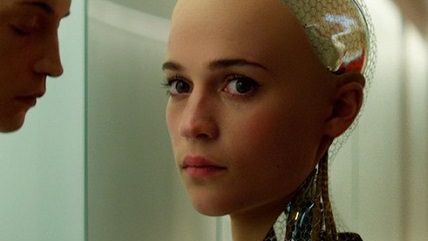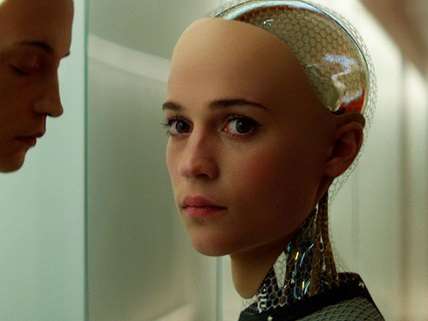Ex Machina: A Small Sci-Fi Classic
Oscar Isaac and Domhnall Gleeson match wits with a beautiful robot.


Alex Garland's Ex Machina probes the eerie menace of artificial intelligence and makes it seem even eerier. The picture's mood is hooded and unsettling, and its subject—the A.I. future that's hurtling toward us ever more rapidly—exudes a slow, screw-tightening horror that creeps off the screen and settles into your head.
The story is naturally set in computer world. Caleb Smith (Domhnall Gleeson), a young programmer with Bluebook, the world's most powerful search engine, is summoned to the home of his billionaire boss, the shadowy Nathan Bateman (Oscar Isaac). His remote estate is a temple of barren luxury, where Nathan—a strange man, both chummy and sinister—is attended only by a mysterious, unspeaking Japanese woman named Kyoko (Sonoya Mizuno). There's a research lab on the premises, and it turns out that Nathan has been very busy in it.
The inscrutable tech mogul tells Caleb that he has created a true artificial intelligence, or at least he thinks so. Its name is Ava (Alicia Vikander), a slender robot with transparent limbs and a beautiful face plate. Bateman wants Caleb to administer a Turing test to determine whether Ava has true human qualities. Can she actually think and feel, or is she only imitating those facilities with state-of-the-art digital precision? Caleb sets right to work, and as his interview sessions with Ava progress, he is drawn into a labyrinth of deceit and treachery that is far above his pay grade.
Ava is disarmingly straightforward: "You can see that I'm a machine," she tells Caleb in their first encounter. Soon, though, it is she who is quizzing Caleb, and perceiving his unease. ("Your micro-expressions are telegraphing discomfort.") Nathan monitors their interviews remotely, but puzzling power cuts intermittently shut down his surveillance. At these points, Ava has much more to impart, mainly about Nathan. "He isn't your friend," she warns Caleb. "You shouldn't trust anything he says." But should he trust her? And who should we trust?
Garland, here directing his first movie, is a specialist in brain-teasing sci-fi. (He wrote Danny Boyle's radiant Sunshine and also scripted Mark Romanek's harrowing Never Let Me Go.) As a filmmaker, he seems fully formed. Ex Machina, which he also wrote, has a rigorously controlled atmosphere. The gray walls, chilly glass partitions and muted lighting of Nathan's somber home are only occasionally aired out with brief scenes set amid the leafy woods and icy mountains nearby. (The movie was partly shot in Norway.) The director has a rare aptitude for intelligent digital effects, too. Ava, with her glowing mechanical innards, isn't a showy CGI creation—she's entrancing. Garland is also adept at structure and pacing, and the story, with its faintly creepy sexual undertow, keeps us off-balance until very near the end.
The actors form a fine chamber ensemble. Isaac's coiled intensity is ideal for Nathan, a man with nobody's best interests at heart. And Gleeson is unsurprisingly skillful at conveying Caleb's clueless innocence (and his own peculiar flaws). But the picture really belongs to the ethereal Vikander, whose robot girl is a disquieting blend of machine-like passivity and all-too-human calculation. "What will happen to me if I fail your test?" she asks Caleb. "Do you think I might be switched off? Do you have people who might switch you off?"
Editor's Note: As of February 29, 2024, commenting privileges on reason.com posts are limited to Reason Plus subscribers. Past commenters are grandfathered in for a temporary period. Subscribe here to preserve your ability to comment. Your Reason Plus subscription also gives you an ad-free version of reason.com, along with full access to the digital edition and archives of Reason magazine. We request that comments be civil and on-topic. We do not moderate or assume any responsibility for comments, which are owned by the readers who post them. Comments do not represent the views of reason.com or Reason Foundation. We reserve the right to delete any comment and ban commenters for any reason at any time. Comments may only be edited within 5 minutes of posting. Report abuses.
Please to post comments


Does Ava become a sexbot?
Never trust any robotic orifice that has teeth.
Is this testing whether I'm a replicant or a lesbian, Mr. Deckard?
On the subject of stories set in computer world, I thought Fat Guy Stuck In Internet was pretty good.
SPOILER ALERT: He asks her about her thoughts on gay pizza and when she loses her shit determines that she is, in fact, true AI.
Pinbot 2, Bride of the Machine is my all-time favorite pinball game.
I'd do her.
Bluebook. Really? Although everything is better with blue in it, the name of this company would be better if it was facetooth.
I'm surprised they could even use that name, seeing as "Bluebook" is already a long established brand.
It's actually a Wittgenstein reference...
Is it a reference to his language games? I'm not too familiar with Wittgenstein, but your comment intrigues me.
My co-worker's step-sister makes $80 /hour on the laptop . She has been out of work for seven months but last month her paycheck was $21155 just working on the laptop for a few hours. find out here now
????????????????? http://www.jobsfish.com
I am interested in seeing this, and I heard an interview with the writer where he doesnt come off as an absolute dolt. That said, there is no way one person can "apply" a Turing test to a known computer during a one on one interview. The whole point is youre not supposed to know its a computer. An interview would immediately invalidate any such test.
Eh the summary is vague ... set in "computerworld"? Not sure what that means. Maybe it can avoid derp.
Currently playing in only 4 theaters in the US, 2 in NYC and 2 in LA.
Can't seem to fine any general release date.
Google pay 97$ per hour my last pay check was $8500 working 1o hours a week online. My younger brother friend has been averaging 12k for months now and he works about 22 hours a week. I cant believe how easy it was once I tried it out.
This is wha- I do...... ?????? http://www.netjob80.com
Sad are the people trying to prove how smart they are in these comments. "It's not a real Turing test..." Oh boy.